
Issue #10, Saturday 27 November 2021
Not very many new releases caught my eye over the last fortnight. I guess during August to November publishers are rushing to get new books out in time for the Christmas trade and after that it slackens off a lot?
Anyway, these still look interesting:
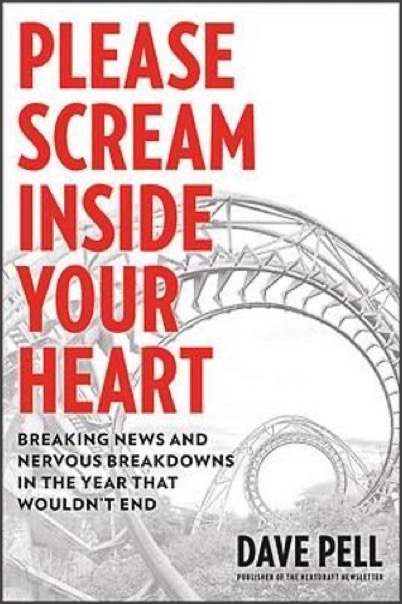
Dave Pell publishes an almost-daily newsletter called Next Draft, which I’ve been following for at least the last couple of years. It’s a really interesting, often fascinating, frequently amusing summary of what is going on in the world but particularly the USA.
Now he’s published a book, Please Scream Inside Your Heart, subtitled “Breaking News and Nervous Breakdowns in the Year that Wouldn’t End”
Please lower your shoulder restraint and keep your hands and feet in. You’re about to board a roller coaster ride through a year that was at once laughable and lethal. If you’ve got an anti-anxiety prescription, now would probably be a good time to call in a refill. Please Scream Inside Your Heart is a time capsule; a real-time ride through the maddening hell that was the 2020 news cycle-when historic turmoil and media mania stretched American sanity, democracy, and toilet paper. Who better to examine this unhinged period in all of its twists and turns than news addict Dave Pell, aka the internet’s Managing Editor? Fueled by the wisdom and advice of his two Holocaust-surviving parents, for whom parts of this story were all too familiar, Pell puts the key stories of 2020 into context with pith and punch; highlighting turning points that widened America’s divisions, deepened our obsession with a media-driven civil war, and nearly knocked the country off its tracks.
I’d love to get hold of this, but the hardback price is a bit too much for me (I have a limited budget, remember?), I might wait for the paperback or ebook, or recommend it to my library.
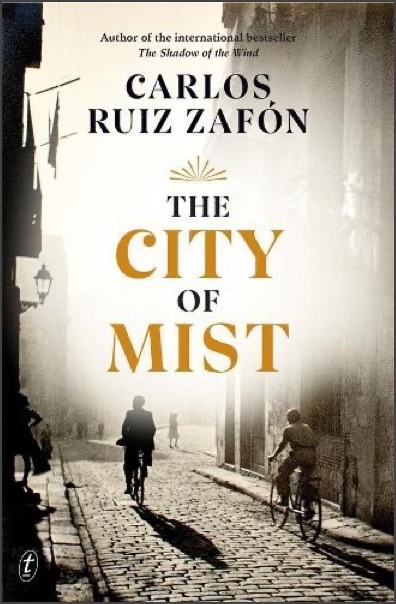
This posthumous collection from Carlos Ruiz Zafón, the New York Times bestselling author of The Shadow of the Wind comprises eleven stories, most never before published in English. The City of Mist is Ruiz Zafón’s tribute to the countless thousands of readers who joined him on the extraordinary journey through the mysterious gothic world of his beloved Cemetery of Forgotten Books quartet.
I confess I haven't yet read any of these books, but The Shadow of the Wind has been on my "To Be Read" list for forever. So seeing this new release has prompted me to borrow the first book in the quartet from the library.
Love the cover design here (I’m a big fan of good cover designs).
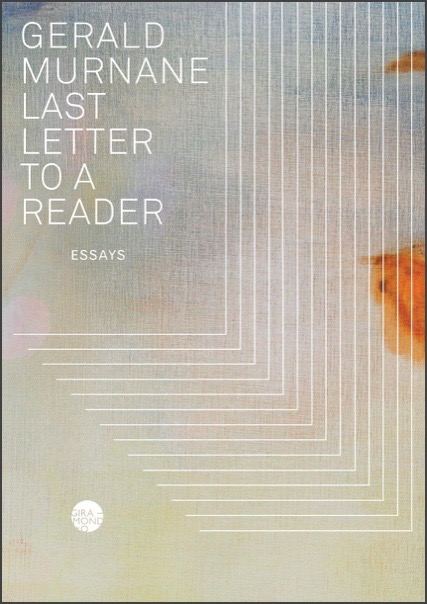
A book which will appeal equally to Murnane’s legion of fans, and to those new to his work, attracted by his reputation as a truly original Australian writer.
In the first days of spring in his eighty-second year, Gerald Murnane began a project which would round off his career as a writer - he would read all of his books in turn and prepare a report on each. His original intention was to lodge the reports in two of his legendary archives, the Chronological Archive, which documents his life as a whole, and the Literary Archive, which is devoted to everything he has written. But as the reports grew, they themselves took on the form of a book, Last Letter to a Reader.
Good friends of mine ran a publishing company in the late 1960s called Norstrilia Press, and were the first to publish Murnane’s remarkable novella The Plains and his novel Landscape with Landscape, so I feel a kind of proprietorial interest in Murnane, who is now a highly regarded Australian writer and has been talked of as a potential Nobel Prize for Literature candidate.
The shortlists for the 2021 Prime Minister’s Literary Awards were announced on 22 October. Winners will be announced in December. I’m only listing a handful of the categories here:
A Treacherous Country by K M Kruimink
In the Time of Foxes by Jo Lennan
Lucky’s by Andrew Pippos
The Bass Rock by Evie Wyld
The Labyrinth by Amanda Lohrey
Flight Lines: Across the globe on a journey with the astonishing ultramarathon birds by Andrew Darby
The Altar Boys by Suzanne Smith
The Details: On love, death and reading by Tegan Bennett Daylight
The Stranger Artist: Life at the edge of Kimberley painting by Quentin Sprague
Truganini: Journey through the apocalypse by Cassandra Pybus
Loner by Georgina Young
Metal Fish, Falling Snow by Cath Moore
The End of the World is Bigger than Love by Davina Bell
The F Team by Rawah Arja
When Rain Turns to Snow by Jane Godwin
Fly on the Wall by Remy Lai
How to Make a Bird by Meg McKinlay
The January Stars by Kate Constable
The Stolen Prince of Cloudburst by Jaclyn Moriarty
The Year the Maps Changed by Danielle Binks
The winners in each category receive $80,000 and the shortlisted writers each receive $5000. All prizes are tax-free.
I finished this book just before the last issue but wanted to wait to give it a proper review this time around.
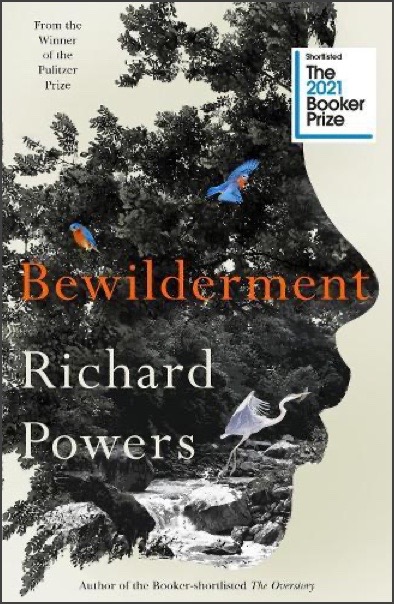
It’s hard to know where to start to talk about this book except to say that I’m pretty sure it’s the best book I’ve read so far this year. You’d think that I could say that definitively but I’ll need to let it sit in my mind for another week or two before I can make a final judgement. Suffice it to say that I think it is very good. It’s beautifully written and so very very relevant to the real world and our current situation.
It’s written in the first person by a man called Theo Byrne who is an astronomer—specifically an astrobiologist—who is coming up with ways to detect and analyse the atmospheres of exoplanets in a search for signs of life.
More importantly, the book is about Theo’s son Robin. He’s introduced with these words, which I think is just wonderful prose:
Robin… my sad, singular, newly-turning nine-year-old, in trouble with this world.
Robin is indeed “in trouble with this world”. He might be autistic or have Asperger’s Syndrome, or something along those lines. Robin is intense, passionate, compulsive, easily frightened, easily angered, sometimes violent. But Theo has had any number of competing diagnoses for his son’s condition, none of which he agrees with. Another quote:
When a condition gets three different names over as many decades, when it requires two subcategories to account for completely contradictory symptoms, when it goes from nonexistent to the country’s most commonly diagnosed childhood disorder in the course of one generation, when two different physicians want to prescribe three different medications, there’s something wrong.
Theo strongly resists having Robin put on medication and as the book opens, Theo has taken his son out of school and onto a trip into the mountains, trying to calm him and settle him by engaging his love of the wilderness and living creatures, something Robin has inherited from his mother Alyssa, who died a few years earlier in a car accident.
Theo and Robin talk often about Theo’s search for life outside the Earth, and specifically about finding intelligent life out there. As one way to calm Robin’s wildly spinning mind, Theo tells him bedtime stories of other worlds which his work might enable us to detect. They are fascinating, imaginary worlds, but ones based firmly on scientific possibility.
I really don’t want to say a great deal more about how the story unfolds except to say that early on Theo reads the novel Flowers for Algernon1 to his son (who becomes very upset about the fate of the mouse), and in some ways Bewilderment is a homage to that book.
Bewilderment is about so many things: the current state of American politics (in the novel there’s a Trump-like president who sends out messages in all-caps); about the climate catastrophe and our apparent inability to do anything much about it; about our turning away from science and logic.
Much more importantly; it’s about fathers and sons; about love; and about heartbreak. Not many books bring me to tears; but this one did.
Highly, highly recommended.
Just a final note: Bewilderment was on the shortlists both for this year’s Booker Prize and the U.S. National Book Award. Richard Powers’ earlier book The Overstory won the Pulitzer Prize for Fiction and was also on the Booker Prize shortlist when it came out. I must try and get hold of that.
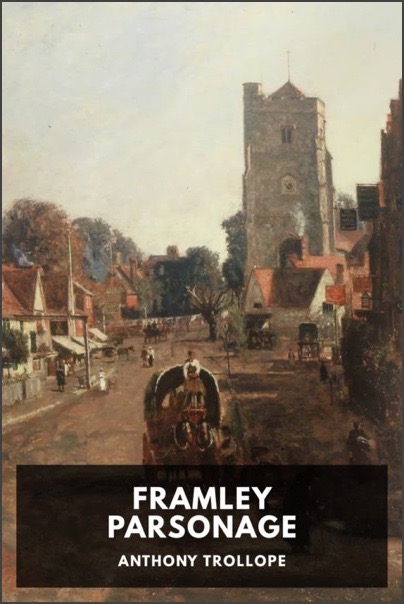
I’m quite fond of Trollope’s mid-Victorian-era novels, though as of yet I’ve only read a fraction of his prodigious output. I read Framley Parsonage because I was producing it for Standard Ebooks. I’m working my way through producing Trollope’s whole “Chronicles of Barsetshire” series, of which this is the fourth. I quite enjoyed this one, which reintroduces a number of characters from the first two books in the series as well as introducing several new ones.
The book primarily concerns the young Reverend Mark Robarts, who has been appointed as vicar of the parish of Framley through the patronage of Lady Lufton of Framley Court, the mother of his long-time friend Ludovic, now Lord Lufton. Robarts is led into the society of some loose-living aristocrats through his friendship with Ludovic and eventually finds himself weakly consenting to his name being included on a bill for a loan to one of his new connections, Sowerby. By so doing, he becomes liable for debts he cannot possibly satisfy. His guilt and fear of the consequences occupy a large part of the book. An important secondary thread involves Robarts’ sister Lucy, who after their father’s death comes to live at the parsonage. Living there, she becomes acquainted with Lady Lufton and her son Ludovic, and romantic complications ensue.
There are interesting subplots featuring characters in earlier books: Doctor Thorne and the heiress Miss Dunstable; and the on-going rivalry between the Proudies and the Grantlys in Barchester.
All of these characters, and their situations, are well-described and interesting. Trollope keeps up the tension of the story pretty well, though we’re in no real fear of an unhappy outcome for either Mark or Lucy.
I chose the painting used for the cover here. It’s Pinner Street by John Buxton Knight.
You can download the book for free here.
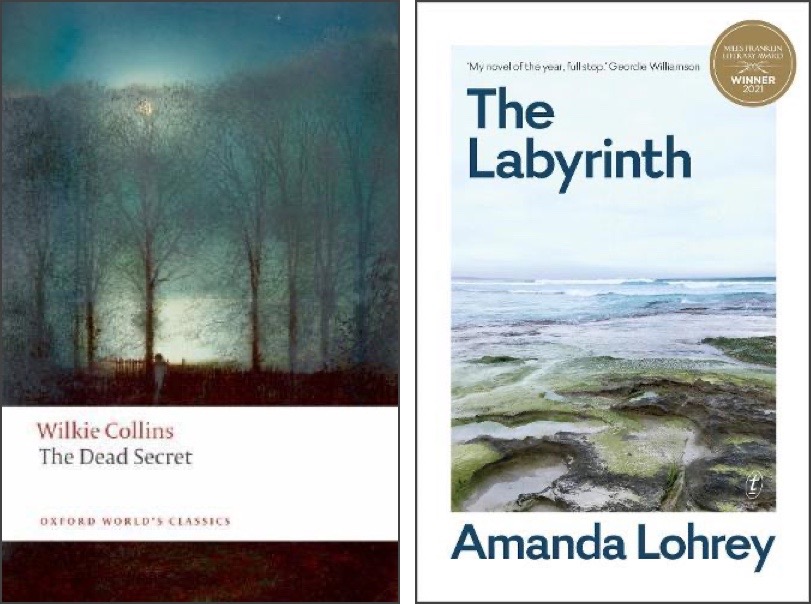
Yet another project for Standard Ebooks (I’m taking a break from Trollope for a while). This one is a re-read for me, but it’s decades since I last read it. I’m only a few chapters in so far.
This was the winner of this year’s Miles Franklin Award. I’m almost done, will review it next issue.
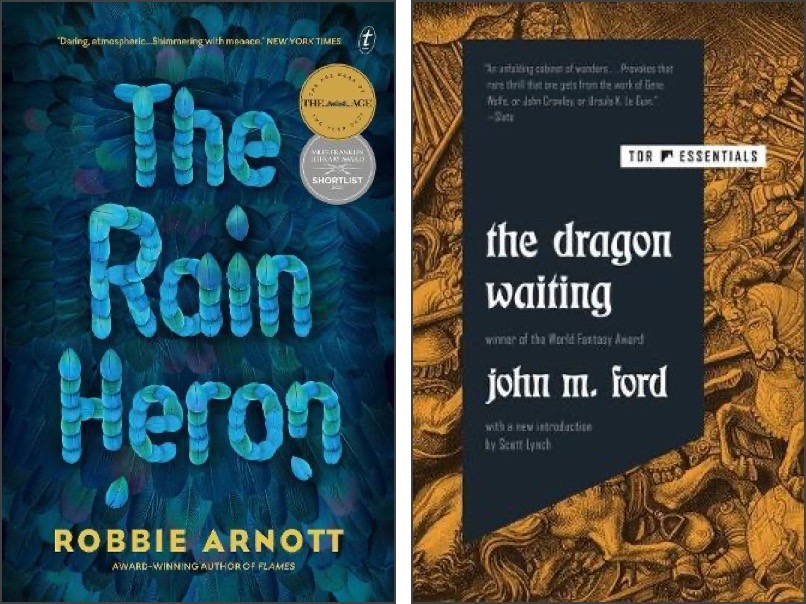
Borrowed from the library, must be read before they get returned.
The Rain Heron by Robbie Arnott: I feel as though I’ve been trying to read this book all year!
The Dragon Waiting by John M. Ford. This alternate history was recommended to me by someone I respect, so…
And that’s another issue in the can. Ten issues! And I’ve managed to stick to a fortnightly schedule.
Don’t forget to check out my podcast, Two Chairs Talking. And please share this post of Through the Biblioscope with your friends.
Flowers for Algernon by Daniel Keyes, 1966, which jointly won the Best Novel category of the Nebula Awards in 1967, sharing the prize with Babel-17 by Samuel R. Delany.
© Copyright 2024 by David R. Grigg
and licensed under Creative Commons License CC BY-ND 4.0.